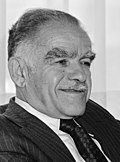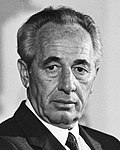First Shamir Cabinet | |
|---|---|
| 20th Cabinet of Israel | |
 | |
| Date formed | 10 October 1983 |
| Date dissolved | 13 September 1984 |
| People and organisations | |
| Head of state | Chaim Herzog |
| Head of government | Yitzhak Shamir |
| Member parties | Likud National Religious Party Tami Tehiya Movement for the Renewal of Social Zionism Agudat Yisrael |
| Status in legislature | Coalition government |
| Opposition party | Alignment |
| Opposition leader | Shimon Peres |
| History | |
| Legislature term | 10th Knesset |
| Predecessor | 19th Cabinet of Israel |
| Successor | 21st Cabinet of Israel |
The twentieth government of Israel was formed by Yitzhak Shamir of Likud on 10 October 1983, following the resignation of Prime Minister Menachen Begin on 28 August. [1]
Contents
Shamir kept the same coalition partners as the previous government, i.e. the National Religious Party, Agudat Yisrael, Tami and the Movement for the Renewal of Social Zionism. The coalition held 62 of the 120 seats in the Knesset. All ministers kept their roles from the previous government, with the only changes being that Shamir replaced Begin as Prime Minister (whilst keeping the Foreign Affairs portfolio), Pesah Grupper being promoted from Deputy Minister of Agriculture (also replacing Begin, who had held the portfolio before), Mordechai Tzipori losing his Deputy Minister of Defense role, and Yehuda Ben-Meir becoming Deputy Minister of Foreign Affairs.
The government held office until 13 September the following year, when the twenty-first government was formed following the July 1984 elections.
10 October 1983 | |||||||||||||||||
| |||||||||||||||||
| |||||||||||||||||

